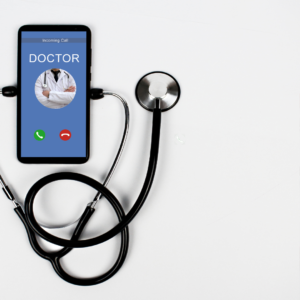5 Reasons Why You Should offer Telemedicine and Telehealth Services in your Hospital
8 mins,



Telemedicine is the future of healthcare delivery and hospitals should do well to adopt it now.
The healthcare system the world over is evolving as a result of an intentional redesign of care delivery by health systems with a focus on telemedicine and telehealth.
COVID-19 took the world by surprise and wreaked untold havoc not only on people but also on the healthcare system of every country. Developed nations were not spared as available data show that they were the most impacted by the pandemic which continues to be felt.

At the beginning of the pandemic, many healthcare systems were thrown into panic mode as we all struggled to understand the common enemy. Clearly, the world was unprepared to deal with a pandemic. The required tools were either non-existent or in low supply.
As most countries enforced lockdown protocols, hospitals were left with little or no options other than to respond to COVID-19 patients and emergencies, shut down temporarily, or risk having doctors and other healthcare professionals get infected with COVID-19.
Either way, the risks were high and fear amongst healthcare professionals was palpable. Many doctors, nurses, and care providers lost their lives to the pandemic and many are still getting infected today. The good news is that you can take practical and proven steps to mitigate the spread of infections.
During the pandemic, his practice struggled to stay open. He had a duty of care for his employees and as a result, he could not risk having younger doctors who work in his practice come to work and get infected with COVID-19. He asked them to stay at home and as a result, he lost a lot of revenue. Income became unpredictable as he did not know when the tide would turn. Luckily, the news of a vaccine filled the air and hope was rekindled. He opened up his practice and started seeing patients while taking the relevant COVID-19 protocols.

As news of the delta variant filled the air and with a record of a case in Nigeria, the younger doctors began to panic. Their fears were valid and Dr. Brian did not know what to do. The practice was yet to recover from the lockdown.
As they brainstormed on what a valid alternative to care delivery could be, one of the doctors suggested telehealth. The team explored the option and soon, the hospital was able to provide care to patients via video and voice conference technology without any loss of revenue.
His doctors now consult with patients from the comfort of their homes without fear or risk of contracting COVID-19.
If this story resonates with you or your hospital management, you certainly have a duty of care for your employees and colleagues and telehealth fits right into the solution box for you.

They’d rather subject themselves to self-medication (which is very dangerous), ask a religious person to pray for them, or seek alternatives that will worsen their health conditions.
Patients do not want to come with a headache and leave your facility infected with COVID-19. Such patients will not mind speaking with a doctor from the comfort of their homes and getting the care they need. Telemedicine is the right solution.

Take a minute to think about how long it takes to train a doctor in school and how much effort he/she must put in to achieve the level of excellence in care delivery that your facility is proud of. To lose a doctor or any staff member due to COVID-19 is not an experience any facility owner or management would want to experience.
Telemedicine helps keep your doctors safe from COVID-19 and other infectious diseases that they risk contracting. With telemedicine, your doctors can keep a safe distance between them and the patient without jeopardizing the quality of care.

Income is the lifeblood of any organization irrespective of its mission and ideals. At the start of the pandemic, many health systems lost a lot of revenue. Many have still not recovered. With the advent of the delta variant of COVID-19, recovery for healthcare systems is still fragile. Telemedicine can help your facility make a quick recovery and probably surpass revenue expectations.

65% of the Nigerian population is between the ages of 18 and 45. Two things are synonymous with this demography. Namely; (a) They like speedy and prompt services, whether it is in a restaurant or at the hospital. (b)They are very comfortable using smartphones and use it for a variety of purposes.
Care facilities that continue to provide care without taking this demography into consideration may quickly run out of patients to care for. Telemedicine is a novel care delivery method that will certainly appeal to this demography. Care facilities that adopt telemedicine today will be the go-to facilities in the future.

This may sound cliché but it is true. The question is: what are you and your hospital management doing to prepare for the future of work?
Many professionals are already working from home permanently. Others report to the office once or twice a week in a hybrid arrangement. All the tools that are needed to make this a reality are available today.
Certainly, your doctors and other healthcare providers cannot and will not be left out of what is fast becoming our reality.
To attract new talent in the healthcare industry, many professionals will prefer to work with an employer who has acquired the necessary tools that allow employees to work in a hybrid arrangement successfully. Using a telemedicine platform that is built to support the future of work is an investment in the right direction.
Those that embrace it now will certainly stay ahead of the curve both in care delivery and revenue generation.

KompleteCare is a telemedicine platform that is built for the future of work in the healthcare industry. It has been designed with the way care is being delivered and medicine is practiced in Nigeria in particular and Africa in general.
With KompleteCare, location is no longer a barrier. Patients anywhere in the world can consult doctors in your hospital with the attendant revenue accrued to your hospital. Registration on KompleteCare is free for hospitals. If you would like to see it in action, click here to schedule a demo.
Still don’t know how to start the process of incorporating telemedicine and telehealth into your practice, today is a good day to REGISTER on the KompleteCare telemedicine platform of choice. Times are changing and everything is evolving at speed. Move with it. In the immortal words of Charles Darwin, “It is not the most intellectual of the species that survives; it is not the strongest that survives; but the species that survives is the one that can adapt and adjust to the changing environment in which it finds itself”.
In what medical areas is telemedicine most applicable and helpful?
Telemedicine is a useful tool for enhancing patients’ continuity of care regardless of location. However, telemedicine is most applicable and helpful in the following areas;
What is one significant contribution of healthcare technology in diagnostics?
Technologies such as MRI, ultrasounds, and CT scans, have helped medical practitioners detect various medical conditions. These technological advancements aid in accurate diagnoses through clear imaging of the internal organs.
What problems are solved by telemedicine?
Telemedicine allows patients to easily schedule a medical appointment through various online platforms. This, in turn, frees up the work time of a hospital’s staff and gives patients the liberty to book appointments on available days without having to make the commute.
What are the benefits associated with telemedicine?
The major benefits of telemedicine are comfort and convenience. Telemedicine enables video or phone appointments between doctors and their patients. So, patients don’t have to drive to the hospital for an appointment. With telemedicine, patients easily can fit virtual visits into their busy schedules.
Does technology have a positive impact on health?
Technology has had a tremendous positive impact on health. With technology, we can download fitness apps and track our fitness activities, we can read articles (just like this one) about healthcare practices, and we can even book an appointment online.
Healthline (2020). 17 Benefits of Telemedicine for Doctors and Patients
Healthline (2019). What Are the Negative and Positive Effects of Technology?
Haleem A, Javaid M, Singh RP, Suman R. (2021). Telemedicine for healthcare: Capabilities, features, barriers, and applications.
Johns Hopkins Medicine. Benefits of Telemedicine

Chidi is the co-founder of Sevenz Healthcare. He's passionate about creating healthcare solutions that facilitate easy access to quality medical care in Nigeria.
We publish helpful posts every week!